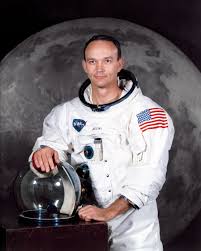A couple of months ago, Apollo 11 astronaut Michael Collins came to Washington to discuss all things lunar. As in a little moon talk, if you will — the good, the bad … and the scary.
Let’s begin in the scare department.
Appearing for a conversation with legendary CBS News correspondent Marvin Kalb during a taping of his television show, “The Kalb Report,” Collins spoke in gripping fashion about his scary thoughts leading up to the mission, before a packed house at the National Press Club.
Kalb related to Collins, who in 1969 was orbiting the moon in the Apollo 11 command module while fellow astronauts Neil Armstrong and Buzz Aldrin were making footprints on the lunar surface: “You admitted to feeling what you called ‘a secret terror.’ That you would have to leave your colleagues on the moon and return to Earth without them, and that, forever after, as you yourself put it, you would be a ‘marked man.”’
Collins responded: “Well, because the flight to and from the moon is a long and very fragile daisy chain of events, any one link in that chain breaks, and everything downstream from that is useless. I was really not too much worried about Neil and Buzz going down (to the moon’s surface). I thought Neil knew how to fly that machine (the lunar module called the “Eagle”) extraordinarily well. He was going to find a safe landing spot, flat enough.
“But the Eagle just had one ascent engine, one little engine bell, one little ignition source, and that worried me. That was such an obvious fragile link in this daisy chain, and if they couldn’t get off, they were dead, and, yes, I was coming home (in the Columbia command module). So, it was a worry, something to keep you awake at night.”
But we, of course, know the rest of the story, as the world recognizes the 50th anniversary of the remarkable moon landing. In July 1969, the ascent engine on the lunar module (transporting Armstrong and Aldrin) performed. And that spacecraft redocked with Collins’ command module in orbit as the three returned intact to Earth, just as President John F. Kennedy requested during his moon-exploration speech in 1961.
Kennedy essentially launched the lunar mission that year when delivering an address to a joint session of Congress. He famously said, “I believe that this nation should commit itself to achieving the goal, before this decade is out, of landing a man on the moon and returning him safely to the Earth.”
Throughout the recent extraordinary Collins-Kalb conversation, one could easily make a module-solid observation: That Collins and his colleagues revered what we will call the Kennedy Quest. Meaning it was obvious they were highly motivated to fulfill Kennedy’s vision.
Collins said of Kennedy’s edict, “I don’t think you could get a politician today to utter a statement, unless he used 10 times as many words. And (Kennedy’s) masterpiece of simplicity gave us our marching orders. It told us what to do, when to do it, and then the-how-to-do-it was up to us, and that’s what we spent days working very diligently at.”
Though Kennedy had been assassinated six years earlier, his spiritual presence was palpable for the astronauts in 1969. Inspiration in pep-talk form.
Said Collins: “As we went through all of the training and preparation, we used Kennedy — ‘Hey, you guys got to get more on the ball. You know what he said. The time’s running out. Get with it. We’re going to be late for this. We can’t do that. You’re falling behind in this part of it.’’’
The three astronauts — all of whom, coincidentally, were born in 1930 — didn’t want to let JFK down.
Despite Kennedy’s optimistic prose, there were doubts. Collins acknowledged that Armstrong assessed the odds at 50/50 that Apollo 11 would be successful. Collins also revealed that he agreed with Armstrong’s assessment. And so did the Richard Nixon White House, apparently.
In fact, historian Douglas Brinkley, author of the new book “American Moonshot,” has said in multiple television interviews that President Nixon essentially took a page out of Gen. Dwight Eisenhower’s playbook from D-Day in World War II. That is to say, Nixon was ready with an Apollo disaster letter, written by senior speechwriter William Safire, if Armstrong and Aldrin ended up stranded.
Nixon’s speech read, in part, “Fate has ordained that the men who went to the moon to explore in peace will stay on the moon to rest in peace. These brave men, Neil Armstrong and Edwin Aldrin, know that there is no hope for their recovery. But they also know that there is hope for mankind in their sacrifice.”
But, like Eisenhower’s just-in-case disaster letter in 1944, Nixon’s script was the best speech never given as the closing odds of Apollo’s success skyrocketed to 100 percent, just as D-Day.
In summary, Collins offered, “That was the end of Kennedy’s dream. It was an honor to be any tiny part of that.”
Collins, Armstrong and Aldrin had fulfilled the Kennedy Quest.

